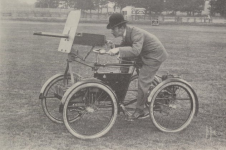Now if city councils tried to actually improve the situation with a variety of traffic delivery modes, rather than, for example, creating a virtuously positive system that because of the ridiculous contract tendering nature of an overly complex and needlessly anonymized procurement prices that resulted in a technically not compliant bidder being granted the total project because they were marginally cheaper than a fully-compliant bidder…until, of course, they were forced to comply with the technical requirements, thus raising their price to be significantly higher than the originally compliant bidder, then the system of transportation faced numerous regular technical issue, up to and including jettisoning major vehicle components at random times and having the control system that the bidder originally forgot to include in their bid then slap-dashed it on even before it was tested for reliable operation, resulting in a practically flawed system…oh, and get rid of your original transportation means based on the promise that the new system would work perfectly, so like explorer Hernán Cortés, who burned his ships in 1519 when he arrived in the New World so that everyone was commuted to the new way, the city’s commuters are fated to the travails of Sisyphus pushing a commuting rock up a never ending hill of commuter hell.
You mean that kind of city council tomfoolery?







